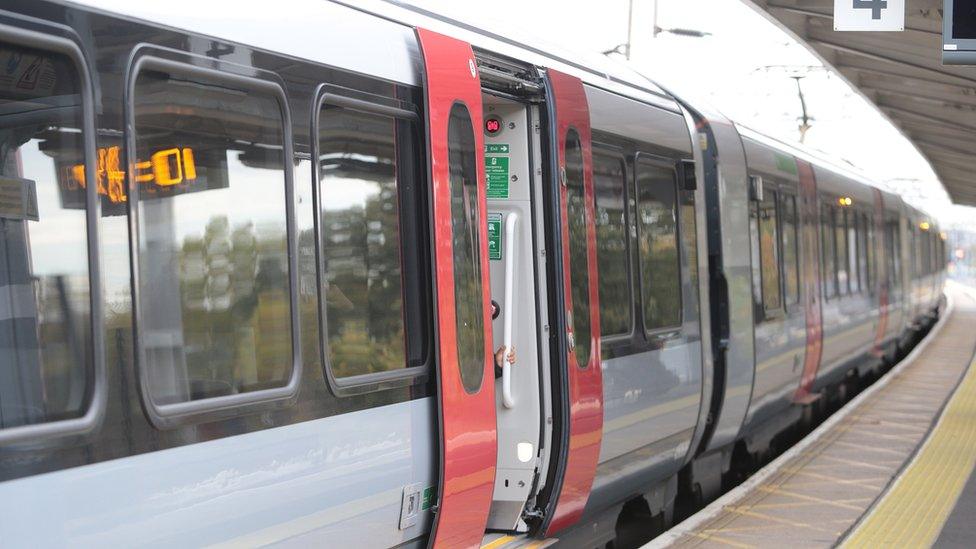Train strikes: Greater Anglia passengers face disruption
- Published

Aslef union members are going to be striking on set dates in April
Rail commuters across the East of England can expect disruption to their journeys due to industrial action.
Members from the union Aslef will go on a 24-hour strike on Monday as they seek better pay and working conditions.
Greater Anglia will run a reduced service on the day and service disruption can also be expected on Thursday, Friday, Saturday and Tuesday.
Passengers have been advised to check their route before they travel.
On Monday, only five core routes will be running in both directions every hour:
Norwich - London Liverpool Street
Stansted Airport - London Liverpool Street
Colchester - London Liverpool Street
Southend Victoria - London Liverpool Street
Cambridge - London Liverpool Street
Services from Cambridge to London Liverpool Street will be running approximately every two hours.
"Apart from the Stansted Express, these services will start much later and will finish earlier than normal," said a Greater Anglia spokesperson.
Action short of a strike will take place on Thursday, Friday, Saturday and Tuesday. The majority of services will run as normal on these days, according to Greater Anglia, but "there will be some alterations and cancellations across our network".
Journey planners, external will be updated with exact train times three days in advance.
In addition, London Underground drivers will also be taking strike action on Monday.
Strike days
Train drivers who are members of Aslef are on strike for 24 hours from midnight on these dates, at these firms:
Friday, 5 April: Avanti West Coast, East Midlands Railway, West Midlands Trains, and CrossCountry
Saturday, 6 April: Chiltern, GWR, LNER, Northern, and TransPennine
Monday, 8 April: c2c, Greater Anglia, GTR Great Northern Thameslink, Southeastern, Southern/Gatwick Express, South Western Railway main line and depot drivers, and SWR Island Line
Why are the strikes happening?
Aslef has been in a 20-month dispute seeking better pay for its members and says train drivers are being asked to sacrifice working conditions in exchange for a wage increase.
In April 2023, its executive committee rejected an offer which would have seen them get a 4% pay rise for two years in a row. There have been no formal talks since.
Aslef general secretary Mick Whelan said the union had called for talks after announcing renewed mandates for industrial action, highlighting that train drivers have not had an increase in salary since 2019.He said: "We are sorry for any inconvenience caused by these service alterations and advise customers to plan ahead and check before they travel."

Follow East of England news on Facebook, external, Instagram, external and X, external. Got a story? Email eastofenglandnews@bbc.co.uk, external or WhatsApp 0800 169 1830
- Published20 March 2024

- Published9 May 2024

- Published1 August 2023
